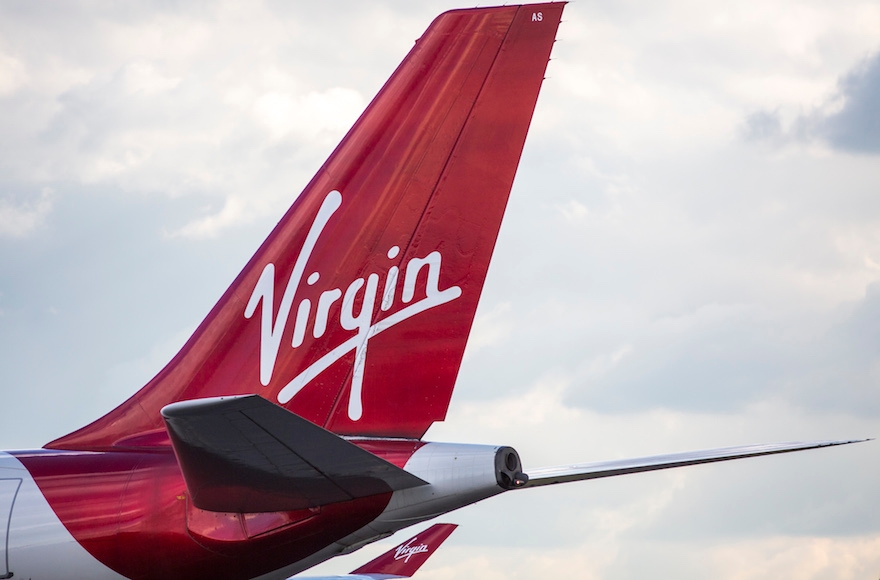(JTA) — Not even couscous is safe from the Israeli-Palestinian conflict.
For decades, Israelis and Palestinians have fought over land. They’ve fought over history. They’ve fought over holy sites and religious doctrine and water sources. Now, apparently, they’re fighting over the delicious grain dish that I always buy when I go to the supermarket, because it costs three bucks and takes five minutes to cook.
(Full disclosure: When I report on Israelis and Palestinians, I do my best to stay objective. But in this particular story, my sympathies are with the couscous.)
Virgin Atlantic, the international airline, made the fateful mistake of putting Palestinian-style couscous salad on their in-flight menu and calling it … “Palestinian couscous salad.”
Big mistake, Virgin Atlantic. Huge.
The airline has clearly not learned the cardinal rule about calling food “Israeli” or “Palestinian” — which is never to do either of those things. Because if you do, people will come after you on Twitter and invoke millennia of history and use words like “terrorism” and “occupation” and “boycott.”
In this case, a guy with — I kid you not — two Twitter followers threatened to boycott Virgin and called them #TerroristSympathizers for calling the dish Palestinian. A few other people also tweeted about it. Another guy posted a comment about it in a private Facebook group.
And so, an international crisis was born. Virgin put out a statement that is absurd in its sincerity about a ridiculous controversy. Here it is, in full:
“Our customers’ experience on board is a key focus and we are constantly refreshing our food offerings on our flights. We recently introduced a Maftoul salad on board our flights. It includes a mix of Maftoul and other couscous, complemented by tomatoes and cucumber and seasoned with parsley, mint and lemon vinaigrette.
“We were aware that Maftoul is not a widely known ingredient – so the dish was listed as a ‘Palestinian couscous salad’, and later as a ‘Couscous salad’. We’d like to reassure all customers that our sole intention was to bring new flavours on board, and never to cause offense through the naming or renaming of the dish.”
This isn’t the first time a social media feud has erupted about Israeli and Palestinian food. It won’t be the last. But in the spirit of peace on earth and goodwill toward people, please read this closely:
Food can be both Israeli and Palestinian. It’s shocking, I know, but it turns out that when two peoples live on the same narrow strip of land for a long time, they end up eating similar things. Israelis have their own kind of couscous, which they call “ptitim.” Palestinians have their own kind of couscous, which they call “maftoul.” And — wait for it — there are other kinds of couscous!
In fact, I’m going to go out on a limb and say this was never really about the couscous. Palestinians fear cultural erasure. Israelis fear delegitimization of their national identity. So they take those very real concerns and project them onto airline food. Or a Rachael Ray cooking show. Or an independent bookstore on the Upper West Side.
In the usual version of this story, pro-Palestinian activists accuse Israel of “co-opting” and “appropriating” indigenous Palestinian food. In this case, it was presumably Zionists accusing Virgin Atlantic of — what? Acknowledging that there is such a thing as a Palestinian? As a pro-Palestinian web site wrote reasonably in its report on the controversy: “The company’s spokesperson was not able to explain why it was offensive to describe as Palestinian a dish that it had itself explicitly affirmed was Palestinian cuisine.”
Virgin Atlantic seemed to learn that when it comes to the Middle East, it’s better to say nothing at all than to seem to be picking sides — or side dishes. As the Arab Israeli chef Nof Atamna-Ismaeel, a winner of the Israeli cooking show “MasterChef,” told an interviewer in 2016, “You can’t escape politics when talking about Arabic food. If you say ‘Israel’ or ‘Palestine,’ it’s immediately political. We’re not Switzerland.”
JTA has documented Jewish history in real-time for over a century. Keep our journalism strong by joining us in supporting independent, award-winning reporting.






